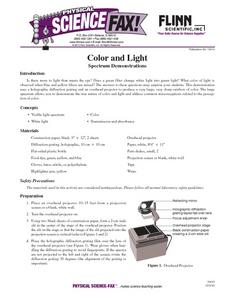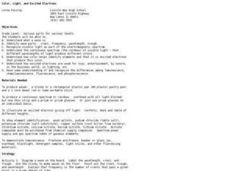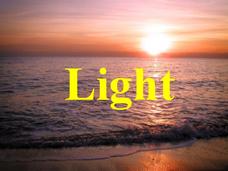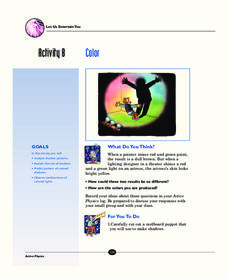Curated OER
Color
For this color worksheet, students read about light, prisms, the RGB model and the CMYK model. Students match colors with their definition, they draw the color chart, they apply the RGB and CMYK models to make colors and they interpret...
Curated OER
Color and Light Spectrum Demonstrations
Students explore the light spectrum. The teacher uses holographic diffraction grafting film on an overhead to demonstrate the true nature of color. After observing a vivid rainbow, students recognize that white light is composed of all...
Curated OER
The Color of Light
Students explore the components of light as a combination of several colors. The focus of the lesson reveals that objects are viewed in a certain color because that color is reflected off of the object.
Curated OER
Color, Light, and Excited Electrons
Investigate color, light and excited electrons and produce waves using slinkys. Your high schoolers will observe a continuous spectrum with a prism and an overhead projector. They observe flame tests to identify elements and they observe...
Curated OER
Light 2: The Lighter Side of Color
Middle schoolers explore light and color, including how colors are mixed to produce new colors, how light is filtered, and how light is reflected off of surfaces.
Howard Hughes Medical Institute
Human Skin Color: Evidence for Selection
Skin color is controlled by at least six genes. Young scientists learn about skin colors through a documentary. They discuss the topics of pigment, natural selection, and vitamin D absorption. They apply their knowledge to higher order...
Howard Hughes Medical Institute
Zebrafish and Skin Color
You may not know if that zebrafish in your fish tank is a model citizen—but it is definitely a model organism! What can we learn about ourselves from a tiny zebrafish? Discover more about the polygenic trait of skin color through a...
Scholastic
Study Jams! Light Absorption, Reflection, & Refraction
Zoe and RJ are trying to photograph an egret on a lake, but they are having trouble with the lighting. Reflection, refraction, and absorption are explored through their thoughtful dialogue so that your physical scientists are illuminated...
CK-12 Foundation
Rose Colored Glasses
How can we change the color of what we are seeing? The simulation allows individuals to change the color of a car's paint, the color of light pointed at the car, and the color of glasses the person is wearing. Each combination creates a...
Curated OER
Light
Here is a stellar slide show for illuminating middle schoolers' minds on the topic of light! An interactive slide allows viewers to sort light sources by whether or not they are man-made. More objects are displayed and learners discover...
Curated OER
A Horse of a Different Color
Elementary schoolers explore the wide variety of horse coat colors and reproduce an existing color as well a create their own horse coat color. There are two fine worksheets embedded in this plan that learners use to crete these coat...
Exploratorium
Bird in the Cage
When your life science class is learning about the eye and how it works, you can add this activity as a demonstration of how the retina holds an afterimage. After staring at a red, green, or blue bird shape, pupils glance at a cage and...
Curated OER
Yellow Days: Studying Vincent van Gogh's Painting
Students examine the painting, "Sunflowers," by Vincent van Gogh noting the use of the yellow color, the wiggly lines, and the "globs" of paint used to create the picture. Pictures are painted using van Gogh's image as a model.
Curated OER
Colored Pencil Value Practice
Budding artists discover what color value means with regard to art. They read the definition of color value at the top of the page, choose three different colored pencils, then use the provided spaces to create color values with each. By...
Curated OER
The Elements of Art Through Photography
Fifth graders photograph examples of the five elements of art: line, shape, color, pattern, and composition.
Curated OER
Black and White Bottle Experiment
Students investigate solar energy and color. In this solar energy lesson, students assess the benefits of solar energy. Students discover that solar energy is attracted to darker colors and conduct an experiment using colored...
Curated OER
The Color Spectrum: How Does it Work?
Create models of the infrared, visible, and ultraviolet portions of the electromagnetic spectrum. Working in small groups, your class can investigate metric conversions calculations. They will find the length of the waves in nanometers,...
It's About Time
Color
How can a hand puppet's shadow look like a dog? The lesson explains the science behind shadows, combining paint colors and the colors used in old televisions. Scholars use white, red, blue, and green lights to experiment with colors...
Curated OER
Take-Home Midterm Exam #3, Part A
Let your physics learners take this electromagnetic radiation exam home to show what they know. You could also use it in class or assign it as a review. The content covers concepts pertaining to color, wavelength, frequency,...
Curated OER
On The Light Side
Kindergartners identify different sources of light in a science activity. They view pictures of a flashlight, a match, and a lamp, among others, and color the part of the picture that creates light. A science activity prompts them to...
Curated OER
Counting Coloring Puzzle
If your kids enjoy color-by-number, they will be excited about this worksheet! Using a color key, they match numbers on a picture of a bee by coloring them the corresponding shade. There is a trick here: although the number 10 is listed...
Curated OER
Color of Stars
Students study the color of stars. In this astronomy based lesson, students observe the colors in an open flame and apply the information collected about color and temperature to the visible light emitting from the photosphere of various...
Curated OER
Color and Spectrum
Students examine the spectra of light sources that have similar colors. For this light lesson students complete an activity using various lights in the classroom and discuss the colors and the heat generated.
Education World
Take Five: Writing a Color-Coded Paragraph
Use a traffic light to model a very basic paragraph plan. The Go, or topic sentence, is written in green and expresses an opinion about the topic. Information that supports the opinion of the Go sentence is written in yellow and the...
Other popular searches
- Primary Colors of Light
- Color and Light
- Properties of Light and Color
- Color and Light Absorption
- Light and Color Spectrum
- Light Color Mixing
- Mixing Colored Light
- Light Energy and Colors
- Light Energy Colors
- Visible Light and Color
- Light Spectrum and Colors
- Primary Color of Light























